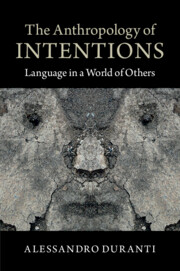Book contents
- Frontmatter
- Contents
- List of figures
- Acknowledgments
- 1 Rethinking anti-intentionalism
- 2 Intentions in speaking and acting: the Standard Theory and its foes
- 3 The avoidance of intentional discourse: a Samoan case study
- 4 The invention of promising in the Samoan translation of the Bible
- 5 Intentionality and truth, revisited
- 6 Speaker intentions and the role of the audience in a political campaign in the US
- 7 A dialogue on intentions
- 8 Opacity of other minds: local theories revisited
- 9 Intentions and their modifications: a lesson from Husserl
- 10 A sense of the other: from intentionality to intersubjectivity
- 11 The intentional continuum
- Appendix A Transcription conventions for English examples
- Appendix B Transcription conventions and abbreviations used in the Samoan examples
- Notes
- References
- Index
1 - Rethinking anti-intentionalism
Published online by Cambridge University Press: 18 December 2014
- Frontmatter
- Contents
- List of figures
- Acknowledgments
- 1 Rethinking anti-intentionalism
- 2 Intentions in speaking and acting: the Standard Theory and its foes
- 3 The avoidance of intentional discourse: a Samoan case study
- 4 The invention of promising in the Samoan translation of the Bible
- 5 Intentionality and truth, revisited
- 6 Speaker intentions and the role of the audience in a political campaign in the US
- 7 A dialogue on intentions
- 8 Opacity of other minds: local theories revisited
- 9 Intentions and their modifications: a lesson from Husserl
- 10 A sense of the other: from intentionality to intersubjectivity
- 11 The intentional continuum
- Appendix A Transcription conventions for English examples
- Appendix B Transcription conventions and abbreviations used in the Samoan examples
- Notes
- References
- Index
Summary
Introduction
In this book I revisit the anthropological critique of analytic philosophers’ theories of meaning and action based on speakers’ intentions. On the basis of the empirical investigation of oral communication, face-to-face interaction, and written texts, I argue that both anthropologists and analytic philosophers overstated their case and that the salience of intentions cannot be decided once and for all because it actually varies across cultural contexts. As we will see, in some cases speakers avoid any kind of discourse about intentions, focusing on the consequences of actions rather than on their alleged original goals. But in other cases, speculation about intentions is present even in societies where people have been said to avoid reading the mind of others. My goal is to support an ethnographic and interactional perspective on intentions as cognitive, emotional, and embodied dispositions always embedded in an intersubjective world of experience. To provide such a perspective, I review previous arguments made by linguistic anthropologists and return to some of the fundamental concepts and claims of speech act theory as elaborated by John Searle over the last half century. In addition to relying on the data from three research projects – one in Samoa and two in the US – I also draw from a number of theoretical perspectives, including Edmund Husserl’s phenomenology, in which both intentionality and intersubjectivity play a key role. The transcripts and written texts I analyze in some detail in the chapters to follow will demonstrate that language – broadly defined – is a great resource for us to understand how particular speakers conceptualize, perform, and understand social action. Whether or not they believe or act as if intentions matter, by using language social agents inhabit a world of others that is constraining, empowering, and inevitable. It is our task as analysts of human endeavors to examine which linguistic expressions make a difference in defining actions and assigning responsibility. Sometimes our previously conceived analytical categories provide us with a useful framework to make sense of new information. Other times, the fit is not there. An anthropological perspective must honor the universal without forgetting the particular. This book is an attempt to apply such a principle of investigation to a complex set of issues and a challenging set of data.
- Type
- Chapter
- Information
- The Anthropology of IntentionsLanguage in a World of Others, pp. 1 - 10Publisher: Cambridge University PressPrint publication year: 2015

